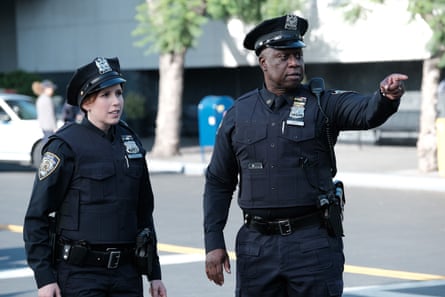The career of the actor Andre Braugher, who has died of lung cancer aged 61, was benchmarked by two performances in police dramas a generation apart. In the groundbreaking drama Homicide: Life on the Street, from 1993 until 1999, he played Detective Frank Pembleton, whose drive immediately made him the anchor of an impressive ensemble cast led by Yaphet Kotto and Ned Beatty. He drew a younger audience with the comedy Brooklyn Nine-Nine (2013-21) as Captain Ray Holt, who takes over a chaotic homicide squad and whose intensity again makes him the heart of the show.
Braugher’s deep, resonant voice and seemingly effortless control drew the respect of all he worked with. David Simon, creator of Homicide and The Wire, said: “I’ve worked with a lot of wonderful actors. I’ll never work with one better.” His classical training, at the Juilliard School in New York, made him a regular at the Public Theater’s Shakespeare in the Park, and indeed his portrayal of Henry V in 1996 won him an Obie (the off-Broadway equivalent of the Tony awards).
He brought the projection of the stage to the small screen. Pembleton was the master of “the Box”, or the interrogation room. He explained to his rookie partner in Homicide (played by Kyle Secor), it was “salesmanship … as silver tongued and thieving as ever moved used cars, Florida swamp land or Bibles. But what I am selling is a long prison sentence.” He dominated those small scenes, but the episode Subway, with Vincent D’Onofrio as a character pushed between subway trains, who will die once the trains are separated, was a two-hander whose intensity might have come from the stage of Beckett, Pinter or Mamet.

In Brooklyn Nine-Nine, as Holt, he played it straight in two senses. The adage of comedy being funniest when played straight gained resonance from Braugher’s ability to show the audience with a gesture or line-reading that he, like you, got the joke. But Holt is also gay. His gayness is never an issue, except as motivation for his progress within the police. It was as if Pembleton were stepping into Kotto’s “Gee” Giardello, a black man with an Italian father who was determined to rise in a white-dominated department.
This drive reflected Braugher’s own background. In the tough neighbourhood of Austin, on Chicago’s West Side, both his parents worked for the government; his father, Floyd, was a heavy equipment operator for the state of Illinois, and his mother, Sally, worked for the US Postal Service. He recalled he might have “pretended I was hard and tough and not square”, but he won scholarships to the Jesuit St Ignatius College prep and then to study mathematics at Stanford University, California. After walking into a student production of Hamlet, and playing Claudius, he decided he wanted to act.
Another scholarship took him to Juilliard. He graduated in 1988 and almost immediately was cast in a TV revival of Kojak, as his assistant. His first film role came in Glory (1989); he was so impressive as the educated Thomas Searles, forced to serve as a private soldier in the all-black regiment commanded by his white friend, that Hollywood came calling, but the parts were standard stereotyical roles. His father had questioned how a black actor would make a living, and Braugher later explained: “I’d rather not work than do a part I’m ashamed of.”
He played the lead in a TV movie, The Court-Martial of Jackie Robinson (1990), playing Robinson, the first African-American player in major league baseball, who earlier in the 1940s, as a US army lieutenant, had refused to ride in the back of a segregated bus; and appeared in another TV film, The Tuskegee Airmen (1995). He was an egotistical actor in Spike Lee’s Get On the Bus (1996), about the Million Man March on Washington DC the year before. In 1998 he won his first Emmy award for playing Pembleton; he was nominated 11 times, and won his second in 2006 for his role in the miniseries Thief.

After Homicide, he starred as a doctor in Gideon’s Crossing (2000-01), as a cop in Hack (2002-04), as a car dealer in the comedy-drama Men of a Certain Age (2009-11) and as the captain of a submarine which goes on the run after he refuses to obey orders to fire nuclear missiles in Last Resort (2012-13). He had another series of remarkable two-handers in a recurring role as Hugh Laurie’s psychiatrist in House, was a defense attorney in episodes of Law and Order: Special Victims Unit, and voiced Governor Woodchuck Coodchuck-Berkowitz in the animated comedy BoJack Horseman.
He made the most of supporting roles in films such as Primal Fear (as Richard Gere’s investigator), Poseidon (captain of the sinking liner), Salt (as the US secretary of defense) and most notably as a New York Times editor in She Said (2022), covering the Harvey Weinstein scandal. He also starred in 10,000 Black Men Named George (2002), the story of the unionisation of Pullman railway porters, who were always called “George” by passengers.
Braugher admitted that his career “could have been larger, but it would have been at the expense of my own life”. He lived in suburban New Jersey with his wife, the actor Ami Brabson (who played Pembleton’s wife in Homicide). He said he wanted his three sons, Michael, Isaiah and John Wesley, raised in a “true context”, away from being a movie star’s offspring in Hollywood.
He is survived by his wife and sons, his brother, Charles, and his mother.
